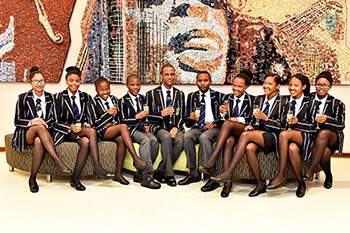Latest News Archive
Please select Category, Year, and then Month to display items
02 January 2025
|
Story Gerda-Marie van Rooyen
|
Photo Supplied
 Leading the research in South Africa is Prof Linus Franke from the Department of Soil, Crop and Climate Sciences.
Leading the research in South Africa is Prof Linus Franke from the Department of Soil, Crop and Climate Sciences.
Scientists are actively pursuing the successful breeding of diploid hybrid potatoes from inbred lines. This is expected to revolutionise potato breeding as it holds the key to rapid genetic progress. It will introduce new varieties for commercialisation through seed. Currently, existing potato variants have a gene that renders self-pollinated seeds infertile.
Prof Linus Franke, an academic in the Department of Soil, Crop and Climate Sciences at the UFS, is leading the research in South Africa. “This technology allows the production of genetically uniform potato seed that is easy to transport and largely disease-free.” He says this differs from conventional breeding whereby only vegetative propagation is possible due to tetraploid varieties in potatoes. It also risks carrying pests and diseases from one generation to the next – leading to the accumulation of pests and diseases with each round of multiplication.
Seed innovation
Prof Franke explains that Solynta BV, a seed company based in the Netherlands that produces potato varieties that can be grown from seed, has included South Africa in their research efforts because it is one of Africa’s largest producers and exporters. Through his academic relationship with Wageningen University and Research, a Dutch institution renowned for its agricultural endeavours and food production, the UFS became involved in researching hybrid potatoes grown from seed.
Diploid seeds containing two sets of chromosomes allow easier gene manipulation to increase predictability and speedier genetic progress. The breeding approach enables the incorporation of tolerance to pests, diseases, abiotic stresses (cold, heat, drought) and other desired genetic traits.
Although Prof Franke is optimistic about this research, he is not blind to disadvantages. “Potato seeds are tiny and have little energy reserves, making it harder to grow potatoes from seed than from tubers.” He says potatoes from seed will take longer to cultivate than tubers, as farmers need to grow plantlets from seeds first, adding six weeks to the growing period. “It is possible that commercial farmers can grow potatoes directly from seed. Alternatively, perhaps more likely, specialised growers will produce tubers of potatoes from seed; these tubers are then sold as seed tubers to other potato farmers, who then continue their normal practices of producing potatoes for the market from tubers.”
Financial benefits
Prof Franke says farmers have reason to get excited. “Seed potatoes will reduce input costs, as varieties with enhanced tolerance to pests and diseases require less pesticides. Planting one hectare of potatoes requires three to four tonnes of potato tubers, but only one 25 g packet of potato seeds.” Since potatoes are a more valuable commodity than maize, this technology might also increase farmers’ income potential.
Cream of the crop of Grade 12 learners invited to become part of Kovsie family
2016-05-06
 |
“You are all here because we believe in you, the cream of the crop of Grade 12 learners in Bloemfontein. We acknowledge you, and hope that you will entrust us with your future, and become part of the Kovsie family.” With these words, Nomonde Mbadi, Director of Marketing at the University of the Free State (UFS), welcomed selected guests to a function dedicated to the top achievers at their respective secondary schools.
Prof Jonathan Jansen, Vice-Chancellor and Rector of the UFS, highlighted an aspect of the university that is often overlooked. “It is extremely important that you not only achieve a degree at university … The greater goal of education is to provide a set of values with which you can interact with humankind.”
Showcasing some of the university’s most talented students, Prof Jansen highlighted achievers such as Nozimanga Bonje, who overcame tragedy, trauma, and hardship to attain her BSc in Genetics and is now studying for her Honours degree; and Tanya Calitz, a newly-graduated (summa cum laude) law student now clerking for Deputy Chief Justice, Dikgang Moseneke, in the Constitutional Court. Prof Jansen also conducted an interview with Kovsies’ sport star, Wayde van Niekerk, who won gold last year in the 400m at the IAAF World Championships in Beijing.
Learners were given the opportunity to pose questions to Prof Jansen, and, afterwards, to interact with deans and faculty marketers to obtain relevant information. The Admissions Department also had several workstations set up with staff members on hand to facilitate online applications for those who had already chosen a field of study.